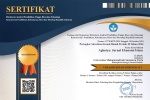Profesionalisme Amil Zakat Dalam Mewujudkan Kesuksesan Zakat
Abstract
Currently, zakat management has become a necessity for the entire community, especially Muslims. Professional zakat management will increase the community's capacity to achieve prosperity when noble social entrepreneurship is known to the public. The aim of the research is to determine the professionalism of zakat amil in realizing zakat success. The research method is literature study (Library Research). The results of the research are Amil zakat. Development of amil zakat is carried out in various ways such as providing knowledge of zakat fiqig, providing knowledge of calculating zakat as well as public speaking training to increase stakeholder trust in the accountability and compliance of zakat management organizations through zakat amil institution. The professionalism of amil zakat is not only sharia knowledge about ZIS (Zakat, Infaq and Alms) but also in relation to management. An amil must have work professionalism, including: Amil zakat must understand the struggle for zakat (Fikih Zakat) completely and in depth, Amil zakat must understand the concepts and practices of zakat management, Amil Zakat must understand the basic and practical concepts of accounting and accountability, and be involved in the Association Amil Zakat.
Full Text:
PDFReferences
Adnan, M. A. (2017). The Need of Establishment of Professional Amil Zakat to Enhance the Future Zakat Development. International Journal of Zakat, 2(1), 71–79. https://doi.org/10.37706/ijaz.v2i1.16
Aziz, M. (2014). Regulasi zakat di Indonesia; Upaya menuju Pengelolaan zakat yang Profesional. Al Hikmah: Jurnal Studi Keislaman, 4(1), 17. https://core.ac.uk/download/pdf/268132613.pdf
Budhi Irawan. (2022). Problematika Persepsi Masyarakat Terhadap Eksistensi Badan Amil Zakat Nasional dalam Konteks Membayar Zakat. Journal of Comprehensive Islamic Studies, 1(1), 67–82. https://doi.org/10.56436/jocis.v1i1.53
Dahlan, D. (2018). Pengembangan Makna Amil Zakat. Al Imam: Jurnal Manajemen Dakwah, 1(1). https://www.ejournal.uinib.ac.id/jurnal/index.php/alimam/article/download/56/56
Friantoro, D., & Zaki, K. (2018). Do We Need Financial Technology for Collecting Zakat? International Conference of Zakat, September. https://doi.org/10.37706/iconz.2018.133
Hamka, Awaluddin, M., K, A., & Nahlah. (2023). Profesionalisme Kerja dan Etika dalam Bisnis Islam. Maro; Jurnal Ekonomi Syariah Dan Bisnis, 6(1), 12–21. https://doi.org/10.31949/maro.v6i1.4124
Iqbal, M., Rusli, R., & Musyahidah, M. (2019). Management Strategies of Professional Zakat Funds for Mustahiq Family Welfare By Amil Zakat Body. International Journal of Contemporary Islamic Law and Society, 1(1), 39–51. https://doi.org/10.24239/ijcils.vol1.iss1.4
Kusumaningtyas, E. A., Asegaf, M. M., & Dikuraisyin, B. (2022). Human Capital Sebagai Strategi Pengembangan Sumber Daya Profesional Di Lembaga Zakat Nurul Hayat. Filantropi : Jurnal Manajemen Zakat Dan Wakaf, 2(2), 155–174. https://doi.org/10.22515/finalmazawa.v2i2.4847
Luthfi, H. (2018). Siapakah Amil Zakat? (M. H. Fauzi (ed.)). Rumah Fiqih Publishing.
Mestika, Z. (2015). Metode penelitian kepustakaan. Yayasan Bogor Indonesia.
Purwanto, A. (2021). Manajemen Zakat Profesional. EUREKA MEDIA AKSARA.
Rois, A. Ka. M. S. D. I. (Kajian D. B. A. Z. N. (BAZNAS), & Suprianto, S. (2021). Analisis Manajemen Sumber Daya Insani (Kajian Di Badan Amil Zakat Nasional (BAZNAS). Musyarakah: Journal Of Sharia Economics, 1(2), 100–109.
http://journal.umpo.ac.id/index.php/MUSYROKAH/article/view/4424%0Ahttp://journal.umpo.ac.id/index.php/MUSYROKAH/article/download/4424/1962
Supriyadi, A. (2020). KOMPETENSI AMIL ZAKAT: Studi Mahasiswa Manajemen Zakat dan Wakaf IAIN Tulungagung Menjelang Praktek Pengalaman Lapangan. El-Barka: Journal of Islamic Economics and Business, 3(1), 110–136. https://doi.org/10.21154/elbarka.v3i1.2019
Suwinardi. (2017). Profesionalisme Dalam Bekerja. Orbith, 13(2), 81–85.
Tjahyanti, S., & Chairunnisa, N. (2021). Kompetensi, Kepemimpinan, Disiplin Kerja Terhadap Kinerja Karyawan Human Resources and Facilty Management Directorate. Media Bisnis, 12(2), 127–132. https://doi.org/10.34208/mb.v12i2.917
Wikaningtyas, S. U., & Sulastiningsih, S. (2015). Strategi Penghimpunan Dana Zakat Pada Organisasi Pengelola Zakat Di Kabupaten Bantul. Jurnal Riset Manajemen, 2(2), 129–140. https://doi.org/10.32477/jrm.v2i2.169
Zaroni, A. N., & Norvadewi, N. (2020). Manajemen Amil Profesional di Lembaga Amil Zakat Dana Peduli Ummat Kalimantan Timur. Al-Tijary, 6(1), 63–77. https://doi.org/10.21093/at.v6i1.2674
DOI: https://doi.org/10.30596/aghniya.v5i2.17381
Refbacks
- There are currently no refbacks.
Aghniya: Jurnal Ekonomi Islam is licensed under a Creative Commons Attribution-ShareAlike 4.0 International License.
Aghniya: Jurnal Ekonomi Islam
Faculty of Islamic Religion,Universitas Muhammadiyah Sumatera Utara. Address: Kampus Utama Jl. Kapten Muchtar Basri No.3, Glugur Darat II,Medan Sumatera Utara-20238.
E-mail: aghniya@umsu.ac.id






